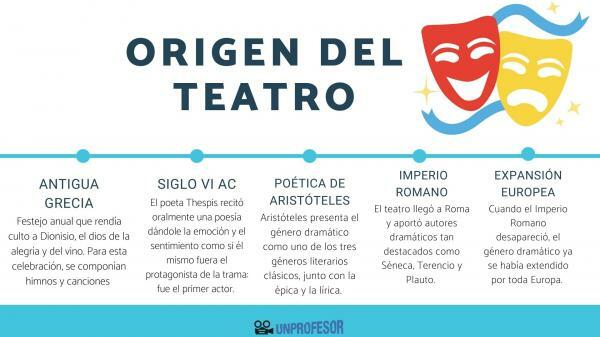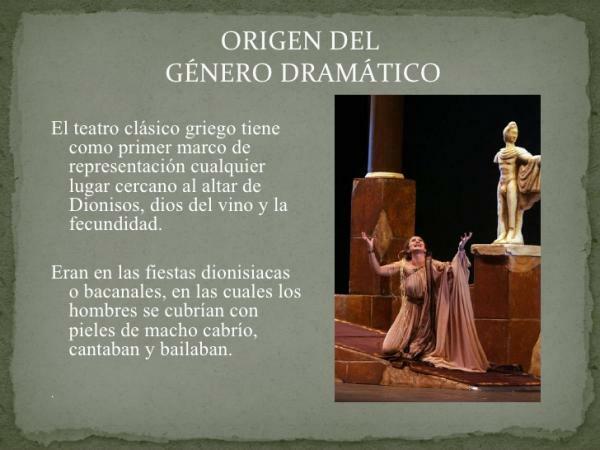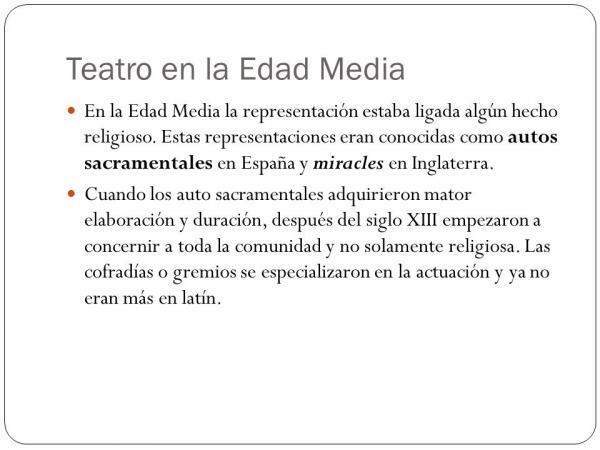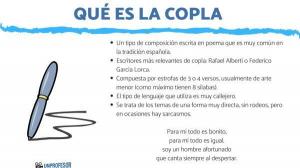Origin of the DRAMATIC genre and evolution

If you want to know what the origin of the dramatic genre we have to travel back to classical times when in the Ancient Greece celebrations began to be held that paid homage to the mythological gods. For these celebrations the poets wrote a series of dramatic texts, theatrical, that were thought, not to be read, but to be narrated aloud by actors who will dramatize the words written.
In this lesson from a PROFESSOR we are going to make a journey towards the origin of the dramatic genre to know the theater history since it appeared and its evolution over time.
Index
- When the dramatic genre was born and its origin
- The dramatic genre in the Roman Empire
- The theater in the Middle Ages
- The theater in the modern era
- Who are the main authors of the dramatic genre?
When the dramatic genre was born and its origin.
To know the origin of the dramatic genre we have to travel to the Ancient Greece, classic civilization in which the first texts appeared that can be considered as dramatic. In this society a type of annual celebration was held that
worshiped Dionysus, the god of joy and wine. For this celebration, they were composed hymns and songs that were presented in a staged way before the public.Over time, these simple hymns evolved and became choirs sung by different people. Little by little, the people who were part of the choir began to have a special role in singing, although we cannot yet speak of the actors themselves.
The celebration of this primitive theater took place until the 6th century BC. As historical sources point out, at this time the poet Thespis orally recited a poem giving him the emotion and feeling as if he himself were the protagonist of the plot: it was the first theatrical performance of history.
If we think of the dramatic genre, the typical symbol composed of two masks: one smiling and the other crying. This symbol also comes from the origin of the genre: the smiling face represents the comedy subgenre and the sad face is the representation of tragedy, the two main sub-genres of theater.
The Poetics of Aristotle
The origin of the theater is also reflected in The Poetics of Aristotle. This book was written in IV BC and, in it, Aristotle presented the drama as one of the three literary genres classics, along with the epic and the lyric.
Furthermore, it is in this publication that Aristotle himself creates the first subdivisions of the genre, that is, the dramatic subgenres: the tragedyand the comedy. With Plautus, a third subgenre was introduced that is currently also considered classic: the hybrid genre that mixes components of both, the tragicomedy.
In this Aristotelian writing, the author also indicates that only noble authors are those who are qualified to write tragedies; on the other hand, comedies are texts indicated for the most vulgar and less educated poets.

The dramatic genre in the Roman Empire.
Now we already know that the origin of the dramatic genre was in Ancient Greece, however, as soon as the Greek Empire fell into decline, it was the Romans who took the lead and, therefore, the theater also came to Rome and contributed dramatic authors as prominent as Seneca, Terence and Plautus.
It is estimated that approximately around 509 BC It was when the theater reached the Roman Empire, due to the expansion that the Roman civilization made through the Mediterranean, reaching the Greek Empire. There are some important changes from Greek and Roman theater, for example, the new drama was less sophisticated and more satirical.
When the Roman Empire disappeared, the drama genre had already spread throughout Europe and, in the Old Continent, it began to undergo a great quantity of changes and modifications.

The theater in the Middle Ages.
During the Middle Ages, the dramatic genre is no longer cultivated by poets. Let us remember that this period is known as the dark age and the dramatic production is almost nil. In the 11th and 12th century in Europe only a type of theater was written that was intended to be represented in centers of worship such as monasteries, universities or courts real. Therefore, lost the social characterl that it had in its origins to become a more elitist genre and for the wealthy classes.
During the Middle Ages, the works that were written were of liturgical theme: representations of scenes from the Gospel, especially focused on peak moments within the Christian religion: Christmas, the Epiphany and the Resurrection. This type of theater spread throughout much of Europe with the desire to spread the word of God to all corners. This type of theater did not arrive in Spain because, at this time, we are in full Moorish times.
In our country we have to wait until the end of the XII or the beginning of the XIII to find the first theatrical work written in Spanish: el Car of the Magi, a theatrical text that represented the moment of adoration of the kings to the Child Jesus and that remains incomplete.

The theater in the modern era.
To continue delving into the origin of the dramatic genre we have to continue with this historical review to, now, focus on the Elizabethan era from England. It was from the sixteenth century when the theater came to this European country and playwrights of the stature of William Shakespeare They began to renovate the theater and give it a more modern and accessible air for all the public.
In Spain, the 16th and 17th centuries are known as the Spanish Golden Age, a century of maximum splendor in the field of letters and culture. The Golden Age theaterIt has two proper names: on the one hand, Lope de Vega, who is considered the greatest renovator of the dramatic genre in Europe, and, on the other, Calderón de la Barca.
Lope de Vega is the author of "The new art of making comedies", a manifesto in which the author bets on a new theater more adapted to the times and that broke with the medieval mark and reinvented the classical tradition imposed in Aristotle's Poetics. In this new dramatic conception, Lope opted for a type of theater that was based on these elements:
- Free theme and choice of the author himself
- Bet on tragicomedy, a hybrid genre that combined comedy and tragedy
- Rupture with Aristotle's 3 units: he only keeps the action unit, the time and place units he breaks
- The works have 3 acts or days, instead of the 4 classics
- He defends the use of a language adapted to the type of character in the work
Lope achieved a theatrical revolution throughout Europe and laid the foundations for creating a more modern and contemporary theater.
At the beginning of the XX we find the theater of Modernism and Postmodernism, a type of artistic current that is committed to linking theater with social and political message and that has great names behind him like George Bernard Shaw, Federico Garcia Lorca and Tennessee Williams.
Who are the main authors of the dramatic genre?
To finish this review of the origin of the dramatic genre, we are going to highlight the 3 classical authors and what are considered gender parents. They are as follows.
Aeschylus
This Greek playwright is considered the father of Greek tragedy. Due to his participation in the wars against the Persians, Aeschylus wrote "The Persians" and "The Seven Against Thebes", two dramatic works in which he tells us of his own war experiences.
Aeschylus wrote a total of 82 plays in his time and was considered the best playwright of the time. Despite his long literary creation, today we only keep seven complete works of him. One of the characters in which Aeschylus most focuses his dramatic production is in Clytemnestra.
Sophocles
This is another of the main authors of the classic dramatic genre. He was born near Athens and went on to write more than a hundred theatrical works, among which the tragedies, although he also has some interesting satirical comedy, such as "Los hounds ". The best-known works of Sophocles and that continue to be studied and represented today are "Antígona", "King Oedipus"or" Electra ".
He is regarded as one of the great Greek tragedians and introduced some interesting changes to the genre: increased the number of the chorus, included a third actor, delved into the importance of dialogues, etc.
Euripides
We end this trip to the origins of the dramatic genre to talk about another of the great playwrights of the classical era: Euripides. He is another well-known and studied Greek tragedian today. His works present a strong trace of the tradition of the Sophists, so we see skepticism towards myths and religious conceptions. Therefore, we are facing a more natural and humanized type of dramatic texts.
In the tragedies written by this author we meet more real characters, in whom we see both the good and the bad and who have to become aware of their destiny. Among Euripides' theatrical innovations we highlight the use of the "Deus ex Machina" or the inclusion of a prologue before each performance. "Medea" is one of the most recognized works of him, as well as "Orestes" or "Troyanas".
If you want to read more articles similar to Origin of the dramatic genre, we recommend that you enter our category of Literary concepts.
Bibliography
- Adrados, F. R. (2012). Ancient Greek theater and Indian theater: their origin in choral dances that pamper ancient myths. Emerita, 80 (1), 1-12.
- Burón, D. R. (2013). THE ORIGIN OF THE EPIC THEATER. FOUNDATIONS FOR ONE. SCIENTIA HELMANTICA.
- Napoli, J. T. (2004). Myth and Dionysian rite in Euripides' Bacchantes: on the ritual origin of the theater.
- Gillet, J. AND. (1925). Las Bacchantes or the origin of the theater.


